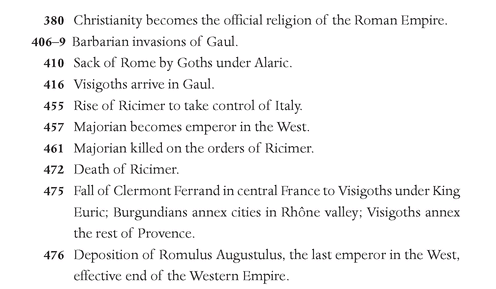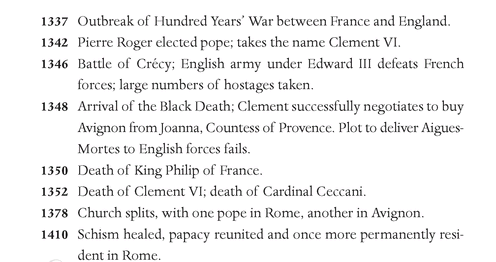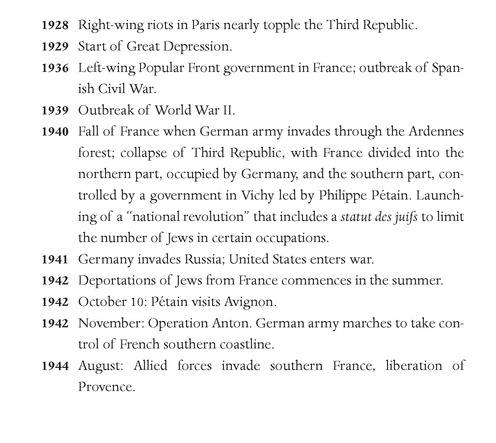The Dream of Scipio (59 page)
Read The Dream of Scipio Online
Authors: Iain Pears

And those people who attacked them, the men like Peter the flagellant and all his followers, were excommunicated, to be hunted down. And all those who helped them were to be excommunicated as well. They were to be chased from the society of men, spurned and shunned, thrown out of any town they approached, or arrested and kept imprisoned until they repented. Rather than using them to persecute the Jews, he turned the full force of papal power and authority on the persecutors. The results were not swift, but they were effective; the assaults on Jews spluttered out, bit by bit, the flagellants and those who came to the surface under the cloak of their piety were crushed.
It was—and is—an extraordinary document, with a few antecedents but no parallels. The sound it made, true, was drowned out by other more raucous voices; the tumult first stirred in Provence by Manlius proved more attractive and more tempting. And yet the little flicker it represented stayed alight for long enough, embodying something of the soul of Olivier de Noyen, and communicating itself down through the centuries until it whispered into the ear of Julien Barneuve as he trudged the last few kilometers to his house.
OLIVIER LIVED OUT the remaining part of his life in the monastery of Saint Jean outside Vaison, whose abbot was appointed under the guidance of Cardinal de Deaux. He arrived one night, in a litter escorted by the pope’s own troops, and no one in that place ever knew his story. All they knew was that he was under the protection of their cardinal, and of the pope himself. He had rendered great service to the church, it was whispered, although what this was was unclear.
He did little in that period; could not talk and could not write. Nor did he attend services unless he had to. Rather, he sat in the sun most of the time, read a great deal—his friends sent him manuscripts to read as they were discovered—and walked. His favorite place was the chapel on the hill about a day’s march away, where his friend had begun painting the life of Saint Sophia. He slept there often, and spent much time in prayer to the saint; it gave him great comfort.
And Rebecca came to him there. Gersonides and she returned to their house when peace came back, and they felt safe. The ordeal had weakened the old man, though; she knew it would not be long before he died.
Olivier tried, and eventually managed, to communicate to her that she should marry, if possible. Or she would be utterly defenseless in the world. But it was not what she wanted.
One day as they were sitting together, looking out over the hills, she stood up suddenly and turned to him. “You were wrong in what you did, you know,” she said. “To protect me, I mean. I did not deserve it. You suffered for nothing.”
He reached out and tried to touch her, to get her to be quiet, but she pulled away from him and continued, the words coming out in a rush now she had summoned the courage to speak at all. “I was born in a small village near Nîmes, and someone betrayed us. There was a monastery nearby and the case was taken to the abbot. And at the end of it, he gave orders that everyone accused of heresy should be executed. They told me it was merciful, that otherwise the monks would come and do as they had before and kill everyone in the region. That this was a kindness on his part to save many others. But still my parents were killed by this act of kindness.
“I ran to the fields and wandered for six years before I came across my master. He found me and took me in and looked after me until I was ready to look after him.”
Olivier looked anguished, made the childish gurgles and chortlings that were the nearest he could now get to speech to interrupt her, but she went on doggedly nonetheless. “That abbot was a great man, and became greater still. A few years later he began to be known as Pope Clement the Sixth.
“When you came for me that night, to take me to the palace, I knew the temptation. I took a potion my master had, which he had always told me never to touch as it was a powerful medicine, dangerous if not taken with care. I put it in my bag, and when I got the chance, I poured it into the well. The moment I’d done it, there was a great shout, and someone grabbed me.”
She paused and smiled. “I tried to explain, you know. I said it was all my doing and tried to tell them why. But they weren’t interested. They thought I would never have done such a thing without my master’s instruction. The stupid thing is that it wouldn’t have worked anyway. Gersonides has told me it was quite harmless when diluted to such an extent. I wanted to confess, but my master said there was no point. No one would believe me, because they wanted to believe Jews were poisoning wells.”
She went down on her knees and kissed his cheek. “You are a good man, Olivier, far better than I am. I hated, and risked the life of my master, and subjected you to this for my hatred. And you now must hate me, too, and I know you will never want to see me again.”
He leaned forward and took her in his arms; he wished more than anything to speak to her and reassure her; his heart was full of wonderful poems; all sorts of words and phrases sparkled in his head, none of which anyone but he would ever hear. But he held her nonetheless, rocking her gently backward and forward, doing his best to stroke her hair with his arm, kissing it with his lips.
“Do you want me to go?” she asked eventually. “Please don’t tell me you do.”
He shook his head fervently, and then she returned his embrace, and they stayed there together for a long time.
He lived for another six months before the burden of his wounds finally pulled him down. Rebecca was with him at the end; the abbot of the monastery understood enough to know she would be his best comfort. And so it proved; Olivier died in almost perfect happiness. The only blemish on his contentment was not knowing when he would see her again. But he believed in eternity, and knew it would not be long.
AS JULIEN WALKED to his house, he began to reach a state of calm that had long eluded him. He arrived at the house about fifteen minutes early; it gave him just enough time to send out a warning that Bernard would be able to see from miles away, something that would make him turn around and go back. He dug up the etched plates from the place where Julia had hidden them and took them into the little kitchen of the house, then got a bottle of the acid she used for biting the lines into the metal, and poured it all over them. Bit by bit the lettering would be erased; that part of his job was done. He lifted the floorboards and took out the little pile of papers inside and put them on the floor. He was not thinking anymore; he merely did the job he set himself, his mind completely empty.
Then he prepared himself, and made a pile in the middle of the living room of all his old notes and papers, his manuscript on Manlius, useless because so wrong. The notes from the Vatican. His draft on Olivier, also erroneous in nearly all respects except for the analysis of the poetry, which still had some merit. None would be missed. They were a record of wasted time and misunderstanding only.
These he stacked carefully, then surrounded them in turn with wooden furniture, the old curtains. Beside them he put his last two-liter jar of kerosene for the little heater, and the bottle of eau-de-vie that Elizabeth Duveau had once given to Julia. A welcoming present, a gesture of friendship.
His last cigarette he took from the packet and put in his mouth, the box of matches on the table, then picked up the kerosene and eau-de-vie and splashed it liberally on the papers and over the furniture. He needed only a few moments for the fuel to soak in; when he judged the moment was right, he took a long puff on his cigarette and exhaled. Then another; his last pleasure. He blew on the end until it glowed brightly and flecks of ash flew off and floated through the beams of light coming through the open window, then dropped it, quite carefully as with all he did, in the middle of the pile of notes.
THE FIRE TOOK hold quickly, sending a billowing column of smoke into the hot summer air, easily seen for miles around by the approaching platoon of Germans, and also by Bernard. The soldiers rushed to the scene but could do little; Bernard, in contrast, took the warning; he turned around and vanished swiftly into the woods he knew so well.
He survived another six weeks before he was captured and killed. Two days after Julien’s death, twenty-six civilians were shot in the quiet courtyard of a farm a kilometer or so outside Vaison.
CHRONOLOGY
Mid fourth century AD
Roman Empire divided into an Eastern Empire, based on Constantinople, and a Western Empire, based on Rome.
Roman Empire divided into an Eastern Empire, based on Constantinople, and a Western Empire, based on Rome.




ACKNOWLEDGMENTS
With thanks to Felicity Bryan, Mih-Ho Cha, Eric Christiansen, Catherine Crawford, Dan Franklin, Robert Gildea, Julie Grau, Lyndal Roper, Georges-Michel Sarotte, Lucinda Stevens, Nick Stargardt and once again, Ruth Harris.
ABOUT THE AUTHOR
IAIN PEARS was born in 1955. Educated at Wadham College, Oxford, he has worked as a journalist, an art historian, and a television consultant in England, France, Italy, and the United States. He is the author of seven highly praised detective novels, a book of art history, and countless articles on artistic, financial, and historical subjects, as well as the international bestseller
An Instance of the Fingerpost.
He lives in Oxford, England.
An Instance of the Fingerpost.
He lives in Oxford, England.
Other books
Promise Kept by Mitzi Pool Bridges
Semi-Tough by Dan Jenkins
Red & Wolfe Part 4: An Erotic Fairy Tale by Ella James
Into That Darkness: From Mercy Killing to Mass Murder by Gitta Sereny
Pandora Gets Lazy by Carolyn Hennesy
Unholy Promises by Roxy Harte
Gently in the Sun by Alan Hunter
Protecting What's His by Tessa Bailey
Asking for Trouble by Rosalind James
Risking Ruin by Mae Wood
